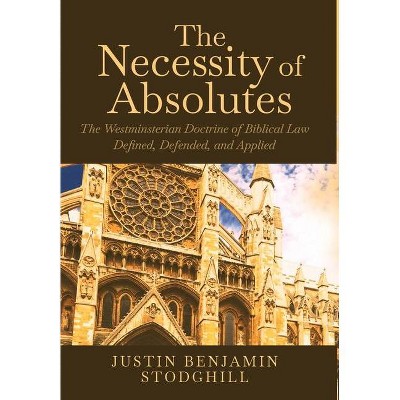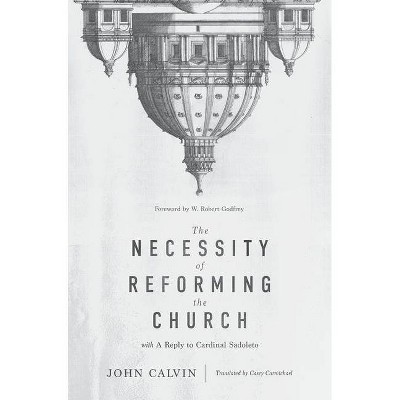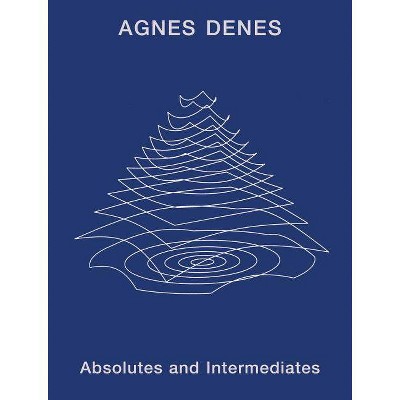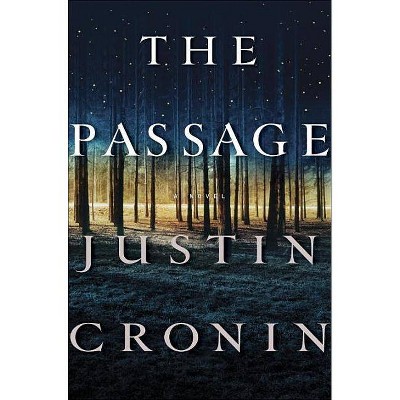The Necessity of Absolutes - by Justin Benjamin Stodghill (Hardcover)

Similar Products
Products of same category from the store
AllProduct info
<p/><br></br><p><b> Book Synopsis </b></p></br></br><p>Biblical Law has been defined differently by different theological backgrounds. Largely ignored, or openly rejected, by many mainstream Protestant Churches, the challenge for the modern Reformed Presbyterian Church is to recover the Biblical teaching of the Law and present it soundly and practically to Christ's body of believers and the world at large. Nowhere is the orthodox teaching of Biblical Law more clearly summarized and taught than in the Westminster Standards. </p><p>This treatise defines, explains, and defends the Westminsterian position on Biblical Law, presenting it as the only Biblically-consistent view of the subject. Beginning with the definition of the Law and its Tripartite division, a defense of the foundational principles of Biblical Law is presented. The following chapter focuses on the Westminsterian position on the perpetuity and universality of the Moral Law, the concept of Natural Law from a Biblical perspective, and the Three Uses of the Moral Law. Next, there is a summary of the treatment of the Decalogue by the Westminster divines, including their explanation of each of the Ten Commandments and the Biblical requirement of Christians to keep the Moral Law despite their inability to do so perfectly. In the fourth chapter, the Westminsterian treatment of the Ceremonial Law and Judicial Law is presented, along with a consideration and rejection of what is commonly referred to as theonomy. The work concludes with a chapter dedicated to the defense of the Westminsterian view against Antinomianism, including New Covenant Theology, along with insights into applying the Moral Law in Good Works and in Ethics.</p><p>The aim of this work is to remind Church officers of the centrality of the Biblical Law in both Testaments of Scripture and encourage the consistent Westminsterian defense, preaching, and application of that Law within the pulpits and institutions of the Church. Ultimately, the goal of this discussion is to magnify and glorify the Legislator, Judge, and King of the Church, the Lord Jesus Christ.</p><p/><br></br><p><b> Review Quotes </b></p></br></br><br><p>There has been no greater controversy in our contemporary Churches than that of the binding nature of God's Moral Law upon men and nations. In his book, <em>The Necessity of Absolutes</em>, Dr. Stodghill has demonstrated once again the historic theological view as set forth in the <em>Westminster Confession of Faith</em> (1647). The view that both men and nations are bound to the Moral Law of God is the Reformed and Puritan position maintained in the historic Christian Church. With careful precision Dr. Justin B. Stodghill works his way through the Theonomist and Antinomian controversies, demonstrating and defending the historic position of the Church. This is a must for pastors, college and seminary students, and Christian laymen alike. </p><p> </p><p><strong>Rev. Dr. Kenneth G. Talbot</strong>, President</p><p>Whitefield Theological Seminary</p><p>Lakeland, Florida</p><p> </p><p>A Study of the Westminsterian view of the Law of God is helpful to all Christians, but especially to those of us who have taken vows stating that the <em>Westminster Standards</em> are what we believe and what we will teach. Dr. Justin B. Stodghill shows us the Reformed historical understanding of the Law's threefold division and the Law's uses in our salvation by examining the teaching of the <em>Westminster Standards</em> on the Law of God. Furthermore, this study helps us deal with issues related to the Law of God both within and outside of Reformed theological circles.</p><p><strong>Rev. Dr. Kyle E. Sims</strong>, Pastor</p><p>First Associate Reformed Presbyterian Church (ARP)</p><p>Lancaster, South Carolina</p><p>Much of modern Reformed thinking and teaching on Biblical Law has been shaped by Theonomy or Reconstructionism, particularly as taught by the late R. J. Rushdoony. Many of Rushdoony's disciples, including Greg Bahnsen, Gary DeMar, Gary North, and David Chilton have taken the baton and advocated his neo-Westminsterian view of the Law. Theonomy denies the three-fold distinction of the Law taught by the Westminster divines. Some such as Rushdoony would reject the covenant of works, which in my opinion opens the floodgate for the Federal Vision error. Dr. Justin B. Stodghill has provided the Reformed world with a clear, precise, and articulate defense of Biblical Law as it is outlined in the Westminster Standards. <em>The Necessity of Absolutes</em> is a refreshing work on the classical Reformed view of the Law that is certainly necessary for the Reformed world in our day. I highly recommend this book as a study of our Reformed standards on this important doctrine. Dr. Stodghill writes with clarity and has done an outstanding work on this topic.</p><p> </p><p><strong>Rev. Stephen Welch</strong>, Pastor</p><p>Reformation Presbyterian Church (RPCGA)</p><p>Sheboygan, Wisconsin</p><p><br></p><br>
Price History
Price Archive shows prices from various stores, lets you see history and find the cheapest. There is no actual sale on the website. For all support, inquiry and suggestion messagescommunication@pricearchive.us




















